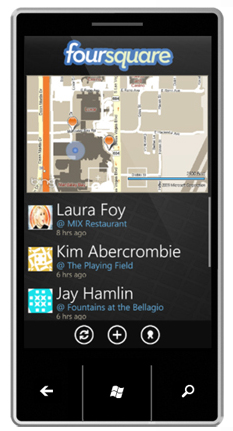Is "social sharing" enough to separate Windows Phone 7 from the iPhone?

There's a lot of Windows Phone 7 information flowing out of MIX10. One of the key features of the Windows Phone 7 being pushed is "social sharing." The idea being that unlike the iPhone, a Windows Phone 7 handset will become the hub for all your social interactions.

And it's a good idea. After all, while Apple likes to appear as hip and "with" the latest trends, it isn't a company that's known for opening doors and creating platforms that third-parties can make use of without extreme levels of control-freakery getting in the way.
Sounds great, doesn't it? Well, maybe not ...
See, the problem here as I see it is that we (the tech users) have been waiting for years for Microsoft to finally see the light when it comes to mobile and actually deliver a platform that gives uses the cutting-edge tools they need for work and play. We've been waiting, and waiting, and waiting. Now, finally, Microsoft seems to be delivering what people want, but it's just too early to get excited. Why? Well, here are just a few reasons:
- First, Microsoft moves with glacial speeds. Let's start off by acknowledging that Windows Phone 7 is a platform that's already some 18 months behind Apple, more if you measure maturity and support, and we're still months away from being able to buy handsets. Want more proof - well, the browser on Windows Phone 7 is based on IE7, not IE8. Sure, there's talk of some features being back-ported from IE8, and jokes that it could be called IE7.5, but it's still a step back.
- Then there's what we can expect from Windows Phone 7 in the future. History is littered with products released by Microsoft that didn't become overnight successes and were then left to erode away in the hands of people who bought into the hype. It's not the Windows Phone 7 handset that you buy during the latter part of 2010 that matters, but how relevant and upgradable that handset will be a year or two down the line. Apple has managed to keep the iPhone platform stable enough over the years so that a first-gen handset is still relevant today, several hardware iterations later. Microsoft needs to assure potential buyers that it's building a platform that it will care for and nurture for years to come, not change or abandon on a whim.
Next -->
- Integration with social media sounds like a good idea, but unless Windows Phone 7 sees regular updates to keep up with social media trends, it'll soon be kicked into the long grass and become irrelevant. While the iPhone model of developers pushing stand-alone apps to the platform might seem clumsy, it does mean that market forces pressurize third-parties to push out updates. So when Twitter adds a new feature, pretty soon all the Twitter clients makers have pushed out updates to support that new feature.
- Is Microsoft using the Windows Phone 7 platform to try to control social media much in the same way the company used Internet Explorer to control the web? While Windows Phone 7 is unlikely to hold enough clout to allow Microsoft to do that, tight integration of social into the platform does pose the risk of stagnation if things aren't carefully managed. It all depends on how well and open the social hub will be.
It's clear to see that Windows Phone 7 shares a lot in common with the Zune, and I think that it will share another feature - of always being second to Apple and the iPhone platform. Why? Because it's a stab at what people want (not a stab in the dark, but still a stab) rather than a natural evolution. Everything that Apple has done with the iPod platform since the first iPods of 2001 has been building to the iPhone and the iPhone OS platform. Even tying Windows Phone 7 so closely to Zune is a gamble, given that Microsoft has had to give that platform shots from the defibrillator and mouth-to-mouth a few times to keep it going.
Finally, even Microsoft itself admits that Windows Phone isn't for everyone. I'll let my colleague Ed Bottexplain:
According to one slide in Belfiore’s deck, the Windows Phone 7 design is aimed at a group they call “life maximizers.” In characteristic Microsoft fashion the design team has created a pair of “personas,” Anna and Miles, who are 38 years old, live just outside Chicago, have one child, are “busy personally and professionally” and are “settled rather than seeking.” If that sounds a lot like a typical Microsoft middle manager (except for the Chicago part), well… you might be right. But based on that description, this series of phones isn’t designed for teens or hipsters.
Ugh ... my takeaway from this is that Microsoft isn't going to go head-to-head with either the iPhone/Android (hipsters) or the Blackberry (dudes in suits like you might see in an IBM commercial) and is focusing on, well, Anna and Miles I guess ...
<< Home >>